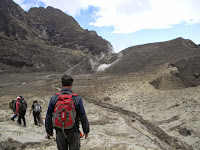 |
| Rucu Pichincha |
The
Pichinchas are two volcanoes in the west of Quito. The inactive volcano, Rucu
Pichincha, is closer to Quito and has an altitude of ca. 4680m. The active
volcano, Guagua Pichincha, lies to the west of Rucu Pichincha (11km west of
Quito) and has an altitude of ca. 4794m. Because of their accessibility from
Quito and their fascinating activity they have attracted many adventurers over
the centuries: La Condamine, followed by Humboldt about 60 years later.
Humboldt actually climbed it twice as he was so fascinated by the volcanic
landscape.
 |
| Guagua Pichincha |
Starting
off from Quito, you drive in the morning (an early start is highly recommended)
to the Andean village of Lloa (3500m) which is situated in the basin southwest
of Quito. From here, a path leads you over the foothills of the slopes of
Guagua Pichincha to a little plain from where you can start your hike up to the
refuge situated below the crater edge. This short hike lakes about 1 hour.
Depending upon the climate you may need a four wheel drive vehicle, which can
bring you up all the way to the refuge. From the refuge it is a short hike up
to the 4.794m high summit. From here you have an amazing view into the
horseshoe-shaped crater, which is open on the western side. The smoke that
emerges from the inside of the crater, as well as the cones of scree and ash,
are a testament to this volcano’s activity.
Furthermore, for the more adventurous hikers, there is also the possibility of entering the wide crater and visiting the dome where fumaroles, sulfurous odors, and noise at various locations within the crater can be experienced. This hike is much longer and more demanding than the hike up to the summit, taking approximately 2 hours from the crater edge down to the dome and about 3 – 4 hours back. There is hardly any shade within the crater so bring plenty of water! Still it is a great (long) day hike through the caldera of an active volcano!



